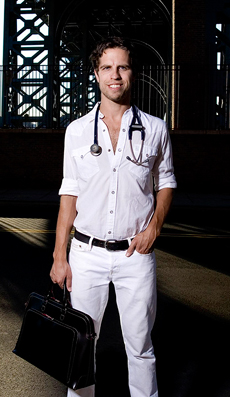 Dr Jay Parkinson, founder and Chief Medical Officer of Sherpaa, has long been an outspoken critic of video visits as the increasingly de facto modality for telemedicine. He argues that Sherpaa's offering of asynchronous doctor visits, carried out by text messaging, is more efficient, more scalable, and more in tune with consumer expectations.
Dr Jay Parkinson, founder and Chief Medical Officer of Sherpaa, has long been an outspoken critic of video visits as the increasingly de facto modality for telemedicine. He argues that Sherpaa's offering of asynchronous doctor visits, carried out by text messaging, is more efficient, more scalable, and more in tune with consumer expectations.
"Secure, asynchronous messaging to solve health problems is convenient, private, effective, and, by far, the most normal form of everyday communication," he wrote in a blog post earlier this year. "And we believe that a wonderful healthcare experience doesn’t ask you to create new behaviors. The best healthcare experience should fit seamlessly into your life and mimic how we all naturally behave."
Now Parkinson has weighed in on the latest trend in home healthcare -- app enabled house calls. Services like Pager, Heal, Dispatch Health, PediaQ, FirstLine and FRND, have all sprung up in the last year promising to deliver an Uber-like experience for a small per-visit fee -- and Parkinson thinks the model is unsustainable and irresponsible.
In this case, Parkinson speaks from experience. In 2007, just three months after the iPhone came out, Parkinson launched a house call service in Williamsburg, Brooklyn. Patients could sign up for an appointment on his website and he'd rush off to see them. Due to an influx of press, the practice took off very quickly.
"I’d say it was the first and only doctor practice to go viral," Parkinson writes. "Due to the press, my practice was almost immediately full... I was walking, riding my bike, or taking cabs trying to see as many patients as possible while also gathering the supplies I needed. I knew I needed those supplies because I designed the process so the patient would explain their issue in the secure form they also used to schedule the appointment."
The upshot of Parkinson's blog post is that, app-enabled or not, home healthcare visits are not, in his opinion, a scalable business model. They're exhausting for the doctors themselves and inefficient for a healthcare system that is already contending with a doctor shortage.
"[P]rimary care doctors are a dying breed," he writes. "We need all of them we can get and we need them to be safely seeing a maximum amount of patients per day. We need to optimize their realistic daily processes and make them markedly more efficient. Every second the doctor is not seeing patients is wasted time. Doctors already spend roughly 40 percent of their day documenting and doing other administrative tasks. To waste the other 50 to 60 percent of your day traveling between patients is a 50 to 60 percent reduction in efficiency. Short of teleportation, the doctor house call will always be an irresponsibly massive reduction in primary care efficiency."
The future of this sort of business, in Parkinson's opinion, is as a high-end luxury service and nothing more.
"I do think they should exist as a ridiculously expensive option for people who don’t care about money..." he writes. "But the VC subsidy will run out shockingly fast and doctor house call visits will no longer be a massively VC-subsidized $29, they’ll be more like $499 or $599. And a shockingly small number of consumers will pay that amount for their pink eye."
Parkinson is hardly an unbiased voice -- these new businesses are, in some ways, competitors to his company. But given his history, it would be a mistake to ignore someone who's been there and done that.


















